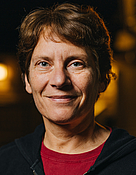Profiles of Leading Women Scientists on AcademiaNet.
Members
List of Members | Expert Search
Search among the members of the Leopoldina for experts in specific fields or research topics.

Image: Andrew Brodhead
Carolyn R. Bertozzi
Nobel Prize in Chemistry 2022
| Year of election: | 2008 |
| Section: | Chemistry |
| City: | Berkeley |
| Country: | USA |
CV Carolyn Bertozzi - German (PDF)
Research
Research Priorities: bioorthogonal chemistry, glycobiochemistry, chemical protein engineering, bionanotechnology, tuberculosis
Carolyn Bertozzi is considered a pioneer in the field of glycobiochemistry, an area of science focused on the function of cell surface glycans. These sugar residues play a key role in cell communication and metabolism and change with various diseases. To observe this phenomenon in living cells, Carolyn Bertozzi established a completely new avenue of research: bioorthogonal chemistry.
Carolyn Bertozzi’s research is at the interface of chemistry, biology and medicine. Her interest in glycans led her to an area of science that had up until that time been largely unexplored. A large portion of all proteins is thought to be glycosylated. Carolyn Bertozzi wants to understand the role these sugars play in biological processes and how glycosylation patterns change in specific terms as people age or become ill. Such an understanding will enable the development of methods for detecting cancers, infectious diseases or autoimmune diseases, for example, at an early stage, and possibly shed light on treatment approaches.
Previously, there was no process for examining these molecules in a targeted way. But thanks to the bioorthogonal chemistry developed by Carolyn Bertozzi, this is now possible. Molecules in living cells can now be chemically modified in such a way that allows them to be observed. In this process, cells are fed reporter molecules, which are incorporated into the glycans through cell metabolism. This “labels” the glycans, which are then attached to other chemical substances, enabling them to be recognised and observed, as well as targeted for therapeutic purposes if necessary. For this to work, the reporter molecules must be bioorthogonal. This means that they must not react with the complex, varied biological environment or be toxic.
Carolyn Bertozzi is also developing further chemistry-based methods for modifying biological systems, including a protein engineering process that enables synthetic proteins to be built, which has led to new developments in protein-based agents. She is also focused on nanotools such as nanoneedles or nanoparticles that can be used to examine cells without damaging them. Last but not least, she also conducts research into tuberculosis pathogens.
To ensure that her discoveries are available for medical applications, she established Redwood Bioscience Inc. in 2008.
Career
- since 2015 Professor of Chemistry, Stanford University/Stanford Chemistry, Engineering & Medicine for Human Health Institute (ChEM-H Institute), Stanford, USA
- 2006-2015 Director, The Molecular Foundry, Lawrence Berkeley National Laboratory, Berkeley, USA
- 2002-2015 Professor of Chemistry and Molecular and Cell Biology, University of California, Berkeley, USA
- 2008 Founder, Redwood Bioscience Inc., Emeryville, USA
- since 2000 Scientist, Howard Hughes Medical Institute, Chevy Chase, USA
- 2000-2002 Professor of Molecular and Cellular Pharmacology, University of California, San Francisco, USA
- 1999-2002 Associate Professor of Chemistry and Molecular and Cell Biology, University of California, Berkeley, USA
- 1996-1999 Assistant Professor of Chemistry, University of California, Berkeley, USA
- 1993-1995 Postdoc, American Cancer Society, University of California, San Francisco, USA
- 1993 Ph.D. in Chemistry, University of California, Berkeley, USA
- 1988 Bachelor degree in Chemistry, Harvard University, Cambridge, USA
Honours and Memberships
- 2022 Nobel Prize in Chemistry (together with Morten Meldal and K. Barry Sharpless), Royal Swedish Academy of Sciences, Stockholm, Sweden
- 2022 Helen Dean King Award, The Wistar Institute, Philadelphia, USA
- 2022 Dr H.P. Heineken Prize for Biochemistry and Biophysics
- 2022 Wolf Prize in Chemistry, Wolf Foundation, Herzlia Pituach, Israel
- 2022 Lifetime Mentor Award, American Association for the Advancement of Science (AAAS), USA
- since 2018 Foreign Member, Royal Society, UK
- 2017 Arthur C. Cope Award, ACS, USA
- 2015 150th Anniversary Alumni Excellence Award, University of California, San Francisco, USA
- 2013 Hans Bloemendal Award, Radboud University Nijmegen, Nijmegen, Netherlands
- since 2013 Member, National Academy of Inventors, Tampa, USA
- 2012 Heinrich Wieland Prize, Boehringer Ingelheim Foundation, Mainz, Germany
- 2011 Tetrahedron Young Investigator Award for Bioorganic and Medicinal Chemistry, Tetrahedron Publications, Elsevier publishing company, Amsterdam, Netherlands
- 2010 Lemelson-MIT Prize, Massachusetts Institute of Technology and Lemelson Foundation, Cambridge, USA
- 2009 Albert Hofmann Medal, University of Zurich, Zurich, Switzerland
- since 2008 Member, German National Academy of Sciences Leopoldina, Germany
- 2008 Roy L. Whistler International Award in Carbohydrate Chemistry, International Carbohydrate Organization, Melbourne, Australia
- 2008 Li Ka Shing Women in Science Award, Li Ka Shing Foundation, Berkeley, USA
- 2007 Ernst Schering Prize, Schering Stiftung, Berlin, Germany
- since 2005 Member, National Academy of Sciences, USA
- since 2003 Member, American Academy of Arts and Sciences, USA
- since 2002 Fellow, AAAS, Pennsylvania, USA
- 2002 Irving Sigal Young Investigator Award, Protein Society, Canyon Country, USA
- 2001 Donald Sterling Noyce Prize for Excellence in Undergraduate Teaching, University of California, Berkeley, USA
- 2001 Berkeley Distinguished Teaching Award, University of California, Berkeley, USA
- 1999 MacArthur Foundation (Genius) Award, MacArthur Foundation, Chicago, USA
- 1998 Beckman Young Investigator Award, Arnold and Mabel Beckman Foundation, Irvine, USA
- 1996 Exxon Education Fund Young Investigator Award, Exxon Mobil Corporation, Irving, USA
- 1988 Thomas T. Hoopes Undergraduate Thesis Prize, Cambridge, USA
- 1988 New England American Institute of Chemists Award, New England American Institute of Chemists, North Andover, USA
- Honorary Doctorate, Freie Universität Berlin, Duke University, Durham, USA and Brown University, Providence, USA

